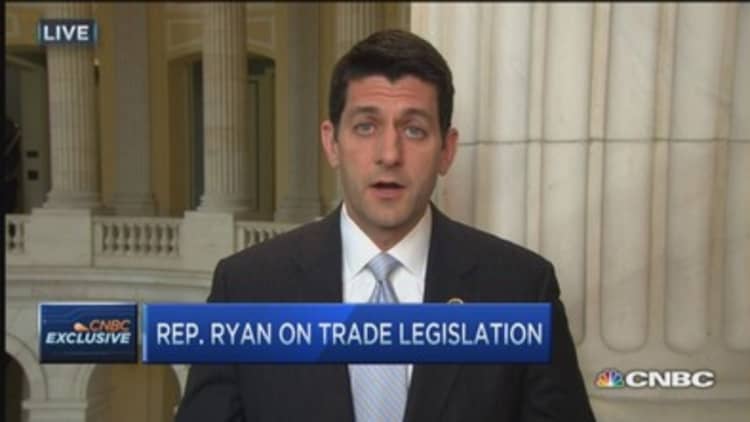
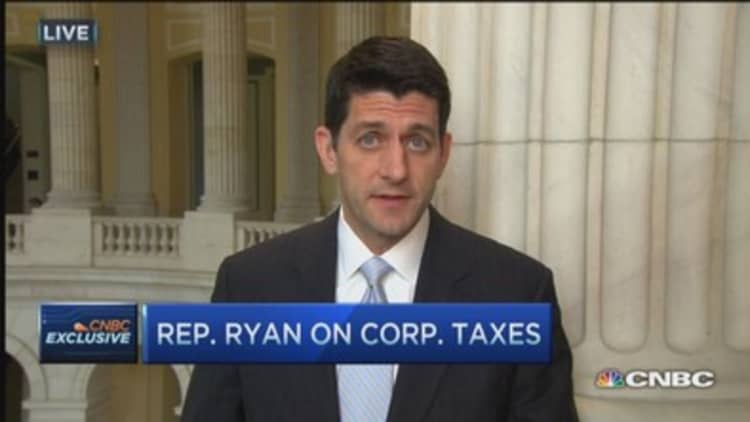
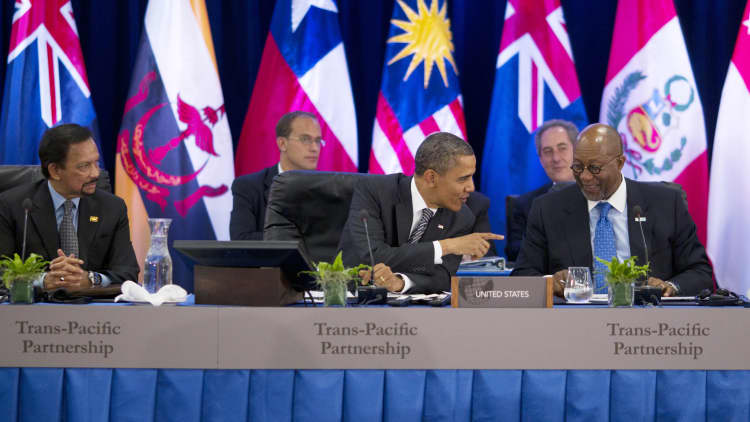
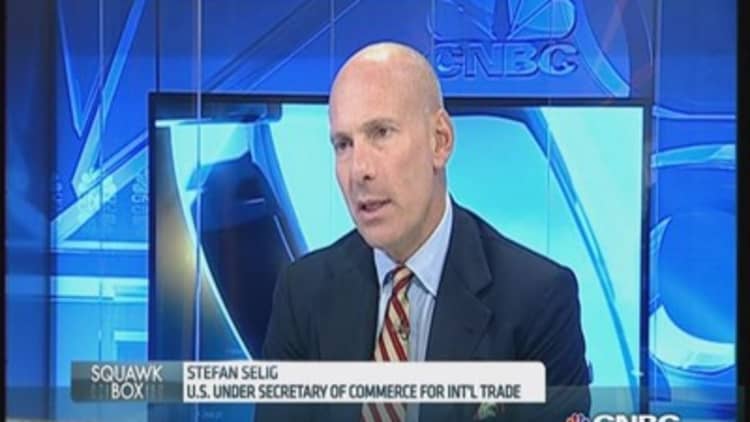
U.S. lawmakers have given the White House a key tool to write the rules for the future of the global economy, Rep. Paul Ryan said Thursday.
Ryan, the former Republican vice presidential candidate and chairman of the House Ways and Means Committee, said in an interview with CNBC's "Closing Bell" that a new bipartisan bill to "fast track" free trade deals through Congress will allow the U.S. to combat Beijing's plans for Asian and global trade.
"China is going around the world trying to write the rules for the global economy to benefit themselves," he said. " I don't think that's in our interest. ... We're either helping shape the global economy, or it's shaping us." (Tweet This)
U.S. lawmakers on Thursday introduced the bill, which would open the door to sealing a major Pacific trade pact called the Trans-Pacific Partnership—a proposed agreement between the U.S. and 11 other countries in Asia or the Americas, which does not include China.
Despite Ryan's assertion, most China experts and U.S. strategic sources have told CNBC that the TPP is not meant to counteract China—or the Regional Comprehensive Economic Partnership, another proposed free trade agreement, which excludes the U.S. and includes China.
"We're certainly not doing this as an anti-Chinese thing," William Craft, the deputy assistant secretary of state for trade policy and programs in the State Department's Bureau of Economic and Business Affairs, told CNBC in March. "We can foresee them joining it."
Chinese rhetoric was initially resistant to the TPP, but recent official statements have suggested a softening stance, Shuaihua Cheng, founder and managing director for the China arm of the nonprofit International Centre for Trade and Sustainable Development, told CNBC in a March interview.
In fact, if China were to join a secondary round of the TPP—or if the agreement were to roll up into a larger regional pact—U.S.-Sino relations could benefit, according to a recent report from former Australian Prime Minister Kevin Rudd.
Furthermore, pitching the TPP as a countermeasure to China's increasing economic influence runs against U.S. policy, experts said.
"U.S. policy since Nixon is that we would support China's rise and bring it into world," Scott Miller, senior adviser and Scholl Chair in International Business at the Center for Strategic and International Studies, said in an earlier interview. "We're much better off with China joining a rules based system."
Administration officials have told CNBC that the reason China is not included in the current round of TPP negotiations is because the country is not up to many of the standards stipulated in American-brokered free trade agreements.
Read MoreMajor Asia-Pacific trade pact enters final stages
Thursday's bill sets new objectives for U.S. trade negotiators, including directing trading partners to avoid manipulating their currencies, in exchange for a yes-or-no vote in Congress.
"This is a smart, bipartisan compromise that will help move America forward," said Republican Senate Finance Committee Chairman Orrin Hatch.
"The renewal of TPA [fast track trade promotion authority] will help American workers and job creators unlock new opportunities for growth and promote better, higher-paying jobs here at home."
Ryan explained that Thursday's agreement helps put Congress and the American public in the driver's seat for TPP negotiations, which had been held behind closed doors and without any prescribed objectives.
President Barack Obama also praised the bill, saying it will help avoid "mistakes from our past" and it "stays true to our values" on trade.
Introducing the bill in the Senate and the House sends a positive signal about the TPP ahead of a planned visit to Washington in late April by Japanese Prime Minister Shinzo Abe.
The deal between Hatch and the panel's top Democrat, Sen. Ron Wyden, to move trade promotion authority in tandem with a bill to extend support for workers hurt by trade is no guarantee legislation will pass Congress, with opponents lobbying hard to defeat it and many Democrats still undecided.
Read MoreWhy we need currency rule in TPP agreement
"You bring up TPA in the House today, the best you would have is a handful of Democrats," Rep. Sander Levin, the top Democrat on the House Ways and Means Committee, said at a Bloomberg conference.
Japan and other TPP partners have said having fast track—which gives trading partners certainty that agreements will not be picked apart—is vital.
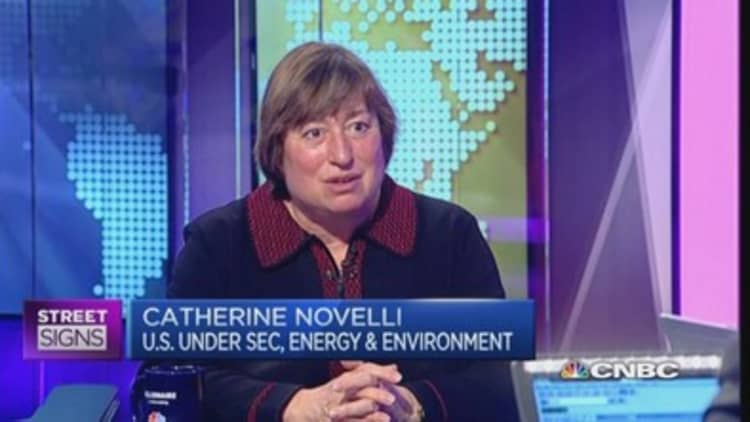
Administration officials have told CNBC in interviews over the past few months that fast track is not absolutely essential to getting a deal done, but would immensely help American negotiators.
"Would it be desirable, useful, helpful to have it? Yeah, you bet," Craft said in March.
But the bill faces opposition from some conservative Republicans opposed to delegating power to the White House, as well as Democrats worried about the impact on jobs and the environment.
Read MoreThe Huge Trade Deal You've Probably Never Heard Of
Sen. Chuck Schumer, who could become the Senate's Democratic leader after the 2016 elections, said he opposes fast track and that it is not fair to rush such an important issue—a point also made by other Democrats.
Unions said they would launch an advertising campaign to pressure senators and members of Congress to oppose fast track, starting with digital ads but possibly expanding to TV, radio and newspapers.
Following the introduction of the fast track bill, several companies—including Honeywell and Cummins—issued statements in support of fast track authority and the TPP.
Administration officials suggested to CNBC last month that the U.S. is getting much of what it wants from TPP negotiations, but there are still some key areas left to settle.
—Reuters contributed to this report


